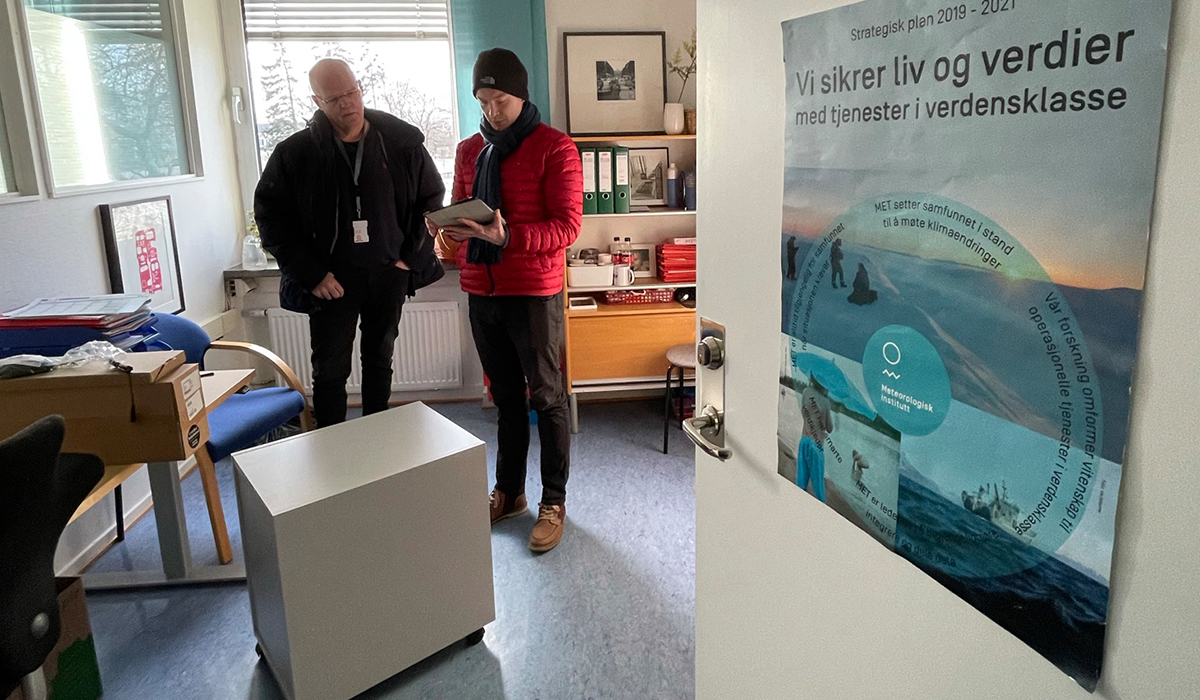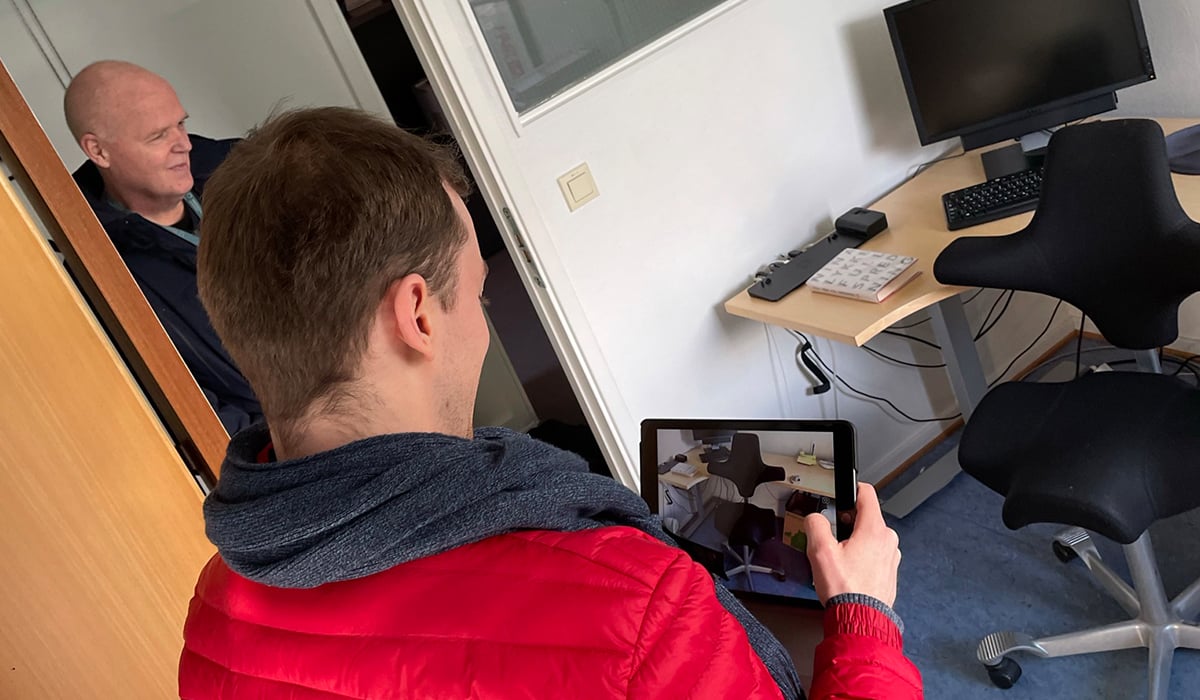4 min read
Taking the step: MET starts their transition to a circular economy
By: Linda Simenstad on Feb 16, 2021 3:58:17 PM

The Norwegian Meteorological Institute (MET) will soon start their first reuse project. MET has chosen Loopfront as their tool in the process. Join us, as Property Manager Kjetil Dahl is testing the platform for the first time!
Why are we here now, what was the motivation for starting this work?
We want to make better use of the plot, get more of our own under one roof. Therefore, this 40 years old, temporary building will be demolished and rebuilt. While this is going on, we will move to another temporary, rented facility. In a couple of years we’ll move back in here again (in a new building).
We already know that there will be demands from above to get started with circular processes.
You could choose not to care for a while, but eventually that won’t be possible anymore. So instead of waiting for the message to come, we start this project now. By getting started, we can be the ones to pave the way.
"You could choose not to care for a while, but eventually that won’t be possible anymore."
After all, we are the Norwegian Meteorological Institute, we should be in front when it comes to climate and environmental protection, and take the measures that make sense. We've talked about the environment and climate emissions for 10 years now - our passive house on the same plot, which will remain standing, is proof of that. So it’s natural for us to take the next step now.
Do you have any specific goals for this reuse project? Any numbers you want to achieve or knowledge that you are aiming for?
Mostly, it's about getting a process started, and achieving systematics.
We will begin introducing a circular economy, and initiate interaction. The interaction will be very useful to us; We also have departments in Tromsø and Bergen, where we have a lot in common. We will greatly benefit from exchanging and shipping, repairing and so on.
"It's about getting a process started, and achieving systematics."
The main goal is to reuse as much as possible, both in the existing and in the new building.
When renting, reuse will also be a focus there; when you rent a building, you often have to make major adjustments and modifications. We will try to avoid this as much as possible this time, and use the building we rent, as it is.
So it's time we start using the Loopfront platform, and map out the values we possess. Then we will hand over the ball to the interior designers, and let them use the materials in the database.
We are just in the process of getting started, and haven’t set any specific figures yet. So far, we don’t even know where we will be renting, and what materials are in that building from before.
But we will learn a lot from this temporary solution, while the building is demolished and rebuilt. We’ll use these experiences to set more concrete goals a bit later. This will be a nice, first test.

What significance will the transition to a circular economy have for a governmental organization such as MET?
When it comes to heavy processes, such as getting started with circular economy, commonly it starts with the government. The government and state must pave the way and show the possibilities for running business on new premises. Then the private market will follow.
Solar panels are one example. Statsbygg invested thousands of euros in the test facilities at Evenstad.
That’s money they won’t get back. But they do get back in reputation and knowledge, and most importantly; they go ahead and lead the way.
Reuse of furniture and building materials is the next example. MET wants to be ahead of this, and perhaps achieve a "contagious effect" on other public agencies. We are part of the “Environmental Family”, i.e. all the agencies under the Ministry of Climate and the Environment (Norwegian Biodiversity Information Centre, Enova, the Norwegian Environment Agency, the Norwegian Nature Heritage Fund, the Norwegian Polar Institute, the Directorate for Cultural Heritage and the Svalbard Environmental Protection Fund).
MET can be the first one out, then the others can look to us and take advantage of our experiences.
MET and Loopfront are both focused on the climate, and we each work in our own way to secure values. Although there are different types of data we collect, there are some similarities in the way we work. How can data collection and digitization contribute to sustainable development?
The overall digitalization strategy of the government and our own department boils down to this: Software must be developed in accordance with the user's needs. We quickly saw when we started this project that we needed a better mapping tool, than spreadsheets and binders.
Our practical approach is to get a good overview of the resources you have. And that is exactly what Loopfront gives us.
"We needed a better mapping tool than spreadsheets and binders."
There is also a set goal of achieving more interaction between the agencies and the private sector. If we get a digital platform to collaborate on, we will not only utilize resources much better, but it will also create new jobs.
I think there is a huge potential in digitization. So we just need to get started, really.
After getting an introduction to the Loopfront platform now, what's your first impression?
My first impression is very good. We need a dynamic database and a structured plan for reusing our own furniture and materials. That's exactly what Loopfront gives us; it is a very practical tool, developed with the user's needs in mind. It’s even in line with the government's digitization strategy, which we must live up to.
I also see a potential to use certain features of the platform in more ways. The QR codes that you can label materials with smart for reuse, but they may also be useful to keep track of inventory in our remote storage.
Even revision of our own values becomes easier with this tool, because now we get a much better overview.
I look forward to get started!
Save both environment and money with Loopfront?
Related Posts
KLP is taking the step towards circular property management
See how the public sector is investing in reuse with Loopfront
In February, Klimapartnere launched a new map service called klimakartet.no, which shows the ...
Tarkett: Circular thinking across all stages
Tarkett is one of the world's leading and innovative manufacturers of sustainable floor and wall ...


